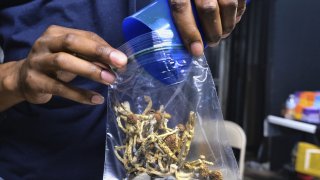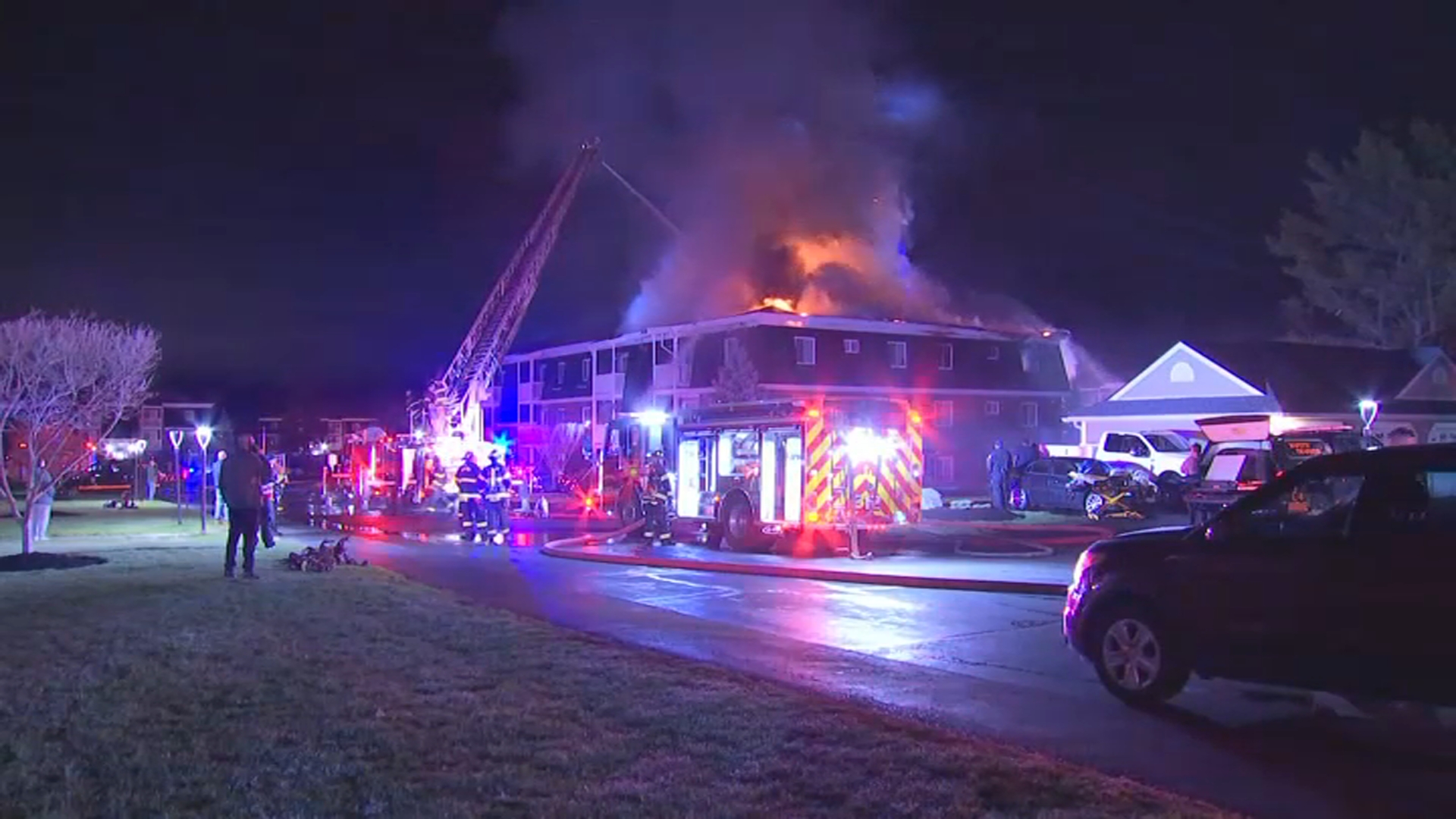
FILE – A vendor bags psilocybin mushrooms at a cannabis marketplace on May 24, 2019, in Los Angeles. California Gov. Gavin Newsom has vetoed a bill aimed at decriminalizing the possession and use of some hallucinogens, including psychedelic mushrooms. The veto, Saturday, Oct. 7, 2023, comes after the Legislature voted to make California the third state to do so. The bill would have removed criminal penalties for the possession and use of psychedelic mushrooms, mescaline and dimethyltryptamine, or DMT. It would only have applied to those older than 21 years old. (AP Photo/Richard Vogel, File)
Provincetown this week became the seventh Massachusetts community to move toward effectively decriminalizing psychedelic plants and fungi, such as psilocybin or "magic" mushrooms and ayahuasca.
The Provincetown Select Board voted to approve a resolution Monday that instructs police officers to deprioritize cases involving psilocybin, and calls for statewide decriminalization and for the Cape & Islands District Attorney to cease prosecution of people possessing, cultivating or distributing psychedelic plants.
WATCH ANYTIME FOR FREE
Stream NBC10 Boston news for free, 24/7, wherever you are. |
The board voted 3-1-1, with member Leslie Sandberg abstaining and chair Dave Abramson voting against the measure.
"I've received a steady stream of emails, as have my colleagues on this topic, and heard people's personal stories, heard people speak here tonight, heard from my colleagues. All very moving stories, and I'm very supportive of this idea," said board member Austin Miller.
Get updates on what's happening in Boston to your inbox. Sign up for our News Headlines newsletter.
Provincetown joins Somerville, Cambridge, Northampton, Easthampton and Salem, where elected officials have passed resolutions directing their respective municipal employees to no longer use resources toward the arrest and investigation of people growing and non-commercially sharing psilocybin mushrooms, according to grassroots advocacy group Bay Staters for Natural Medicine, who has worked with the municipalities to pass the measures.
In Worcester, the plants are decriminalized for veterans and first responders only, and the Amherst Town Council passed a resolution supporting decriminalization.
Supporters say small doses of psilocybin can help people suffering from addiction, mental health issues, cluster headaches and other medical issues. Some also tout recreational uses of the plants, which they say can bring people together for a spiritual experience, but unlike other drugs, are non-addictive.
Local
In-depth news coverage of the Greater Boston and New England area.
John Golden, vice chair of the board, said psychedelics could help address the opioid and mental health crises, which have hit Cape Cod particularly hard.
"We have a lot of people not being treated, and usually the medical profession says, 'Let's treat them with antidepressants.' We now have detectable levels of antidepressants in our water. That is insane. Everybody is being dumped and dumped and dumped with antidepressants all the time by the medical community," Golden said. "If this could help cure the opioid crisis, it would be amazing. And we wouldn't have all those antidepressants in our groundwater."
James Davis, who leads Bay Staters for Natural Medicine, said at Monday's select board meeting that psilocybin helped his brother stop using drugs after struggling with opioid addiction for years. The grassroots group hosts "curated mushroom forages" and "educational potlucks" and lobbies on the municipal and state level for decriminalization.
This recent local push comes against the backdrop of an escalating battle over an initiative petition that could go before voters next fall to decriminalize psychedelic plants statewide.
Bay Staters for Natural Medicine has pushed for these local resolutions, and is supporting bills from Republican Rep. Nicholas Boldyga (H 3589), which would legalize some psychedelic plants and fungi for people ages 21 and older, and similar bills from Democrats Rep. Lindsay Sabadosa and Sen. Pat Jehlen (H 1754 / S 1009) that would open up use of the so-called plant medicine -- specifically psilocybin, psilocin, dimethyltryptamine, mescaline and ibogaine -- to individuals ages 18 and older.
The local group opposes the ballot initiative by D.C.-based New Approach, who recently dubbed their campaign in the Bay State "Massachusetts for Mental Health Options." The D.C. group helped secure passage of similar ballot questions in Colorado and Oregon, and would set up a licensed regulatory therapeutic framework using natural psychedelics.
This would allow residents to be screened by a licensed facilitator who has gone through a state-regulated training process, and if approved, be administered psilocybin under the facilitator's supervision, according to campaign director Jarad Moffat. Afterwards, they would continue to see the facilitator for therapy sessions where they unpack their experience.
Davis has said that this approach would make psilocybin extremely expensive.
In Oregon, where New Approaches helped make psychedelic mushrooms legal in 2020, a regulatory framework has led to tens of thousands of dollars in up-front costs for so-called psilocybin service centers to open; and people who want to provide therapy with mushrooms have racked up licensing fees and education costs, which are passed to consumers, Oregon Public Broadcasting reported.
Davis and other local advocates are instead promoting a model where the plants are decriminalized and residents can grow and share their own supplies. Under Boldyga's bill, counselors would be certified to facilitate psychedelic experiences, and could charge for the service, but it would look less like the regulatory-heavy strategy Massachusetts took in setting up the Cannabis Control Commission.
The Provincetown resolution references the U.S. Department of Justices' Cole Memorandum, which permitted communities to deprioritize enforcement of cannabis.
Select board members discussed a potential advantage for the Cape town if psychedelics were decriminalized and counselors could hold psilocybin experience sessions "above board".
"Our economic analysis indicates this could generate nearly $13 million a year in tax revenues for this municipality, as well as many economic activity at stores that will serve clients that come here for retreats," Davis told the select board on Monday.
He said that licensing counselors to host psilocybin treatment experiences, which would need to go through the state, could bring tourism to Massachusetts from folks coming from out of state.
The Provincetown resolution does not authorize any commercial sale of psychedelic plants, but supports the bills that seek to set up a license structure for therapists "without an unelected control commission prone to regulatory capture by interests outside our communities."
All five of the Provincetown select board members said they recognized the medical benefits, and were supportive of decriminalizing psilocybin to be used by medical professionals to treat post-traumatic stress disorder, mental health issues and addiction. But for the member who abstained, Sandberg said she couldn't support the resolution as written because it would support recreational use.
"I think how it helps people under medical supervision is amazing. I don't think it should be for recreational use," Sandberg said. "People are going to start self medicating."
Chair Abramson said he wanted to bring the issue directly before voters at Provincetown's town meeting next spring, but Davis urged the board to take it up more immediately to send a message to the Legislature amidst the ongoing ballot question battle.
"This is to make the state Legislature look at what we're doing, and say, 'Oh, look at this,'" Golden said. "There's a lot of towns. And the list, I mean Cambridge and Somerville -- they're not little places ... I just think that Provincetown has always been at the forefront, and we've just got to move forward."



